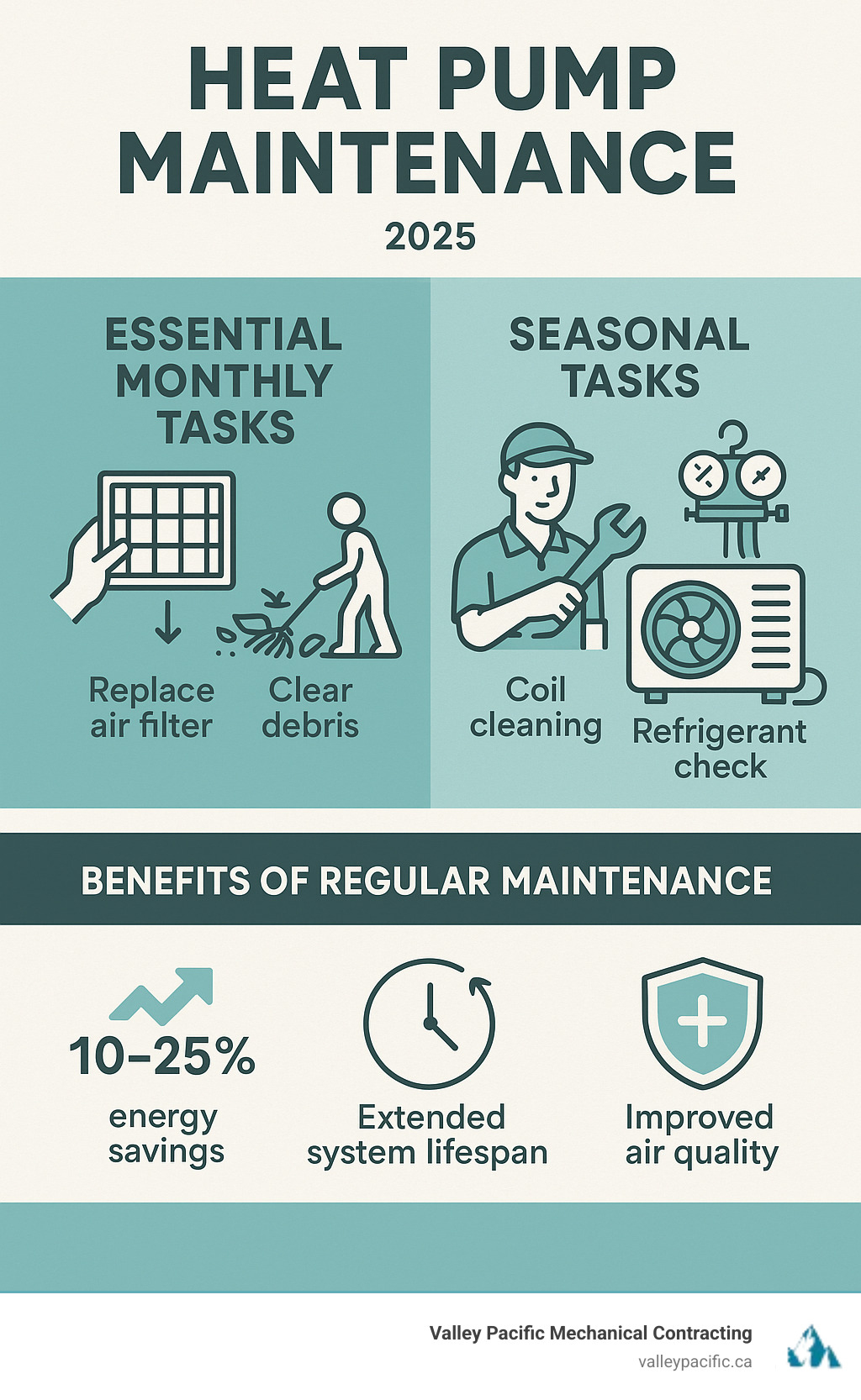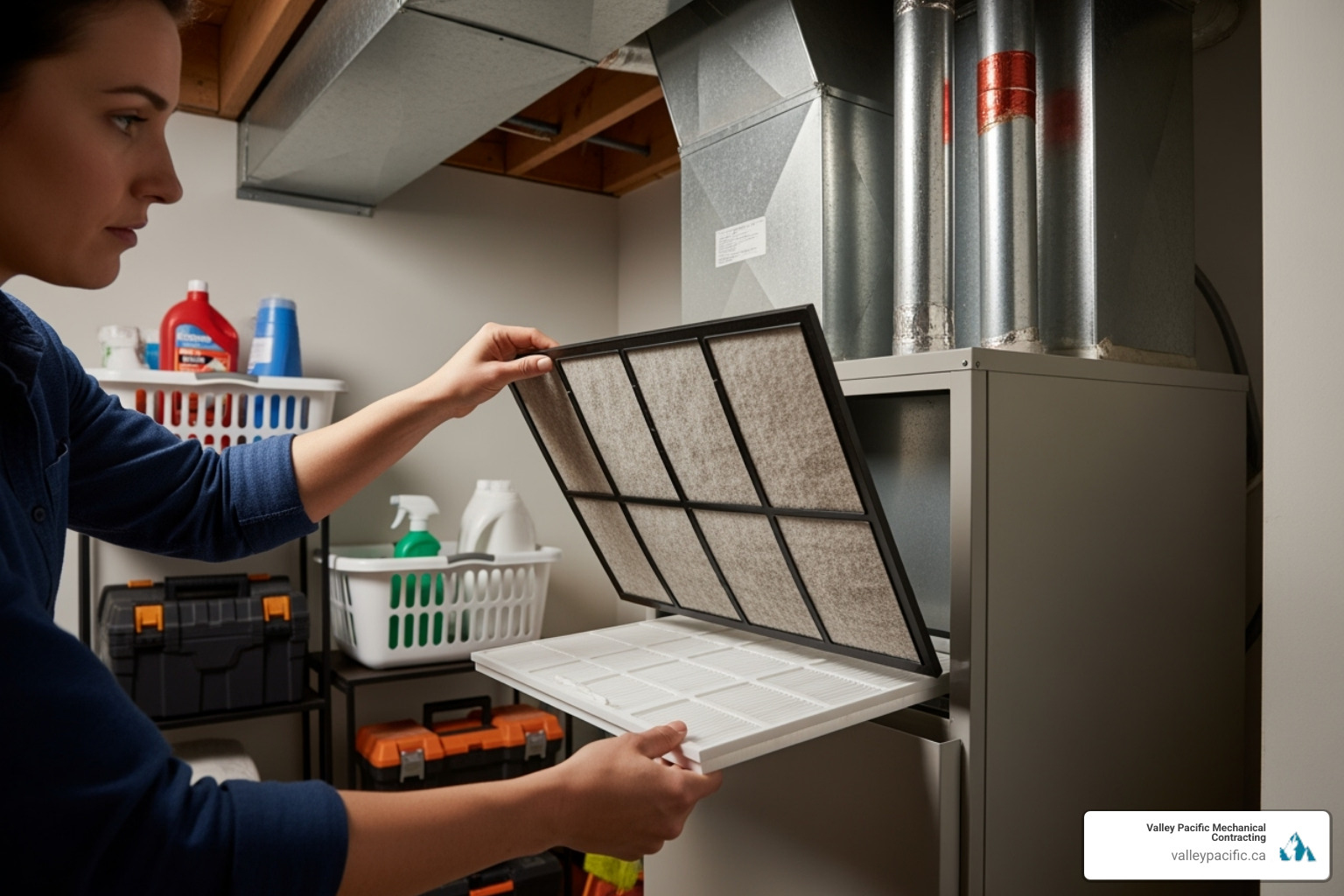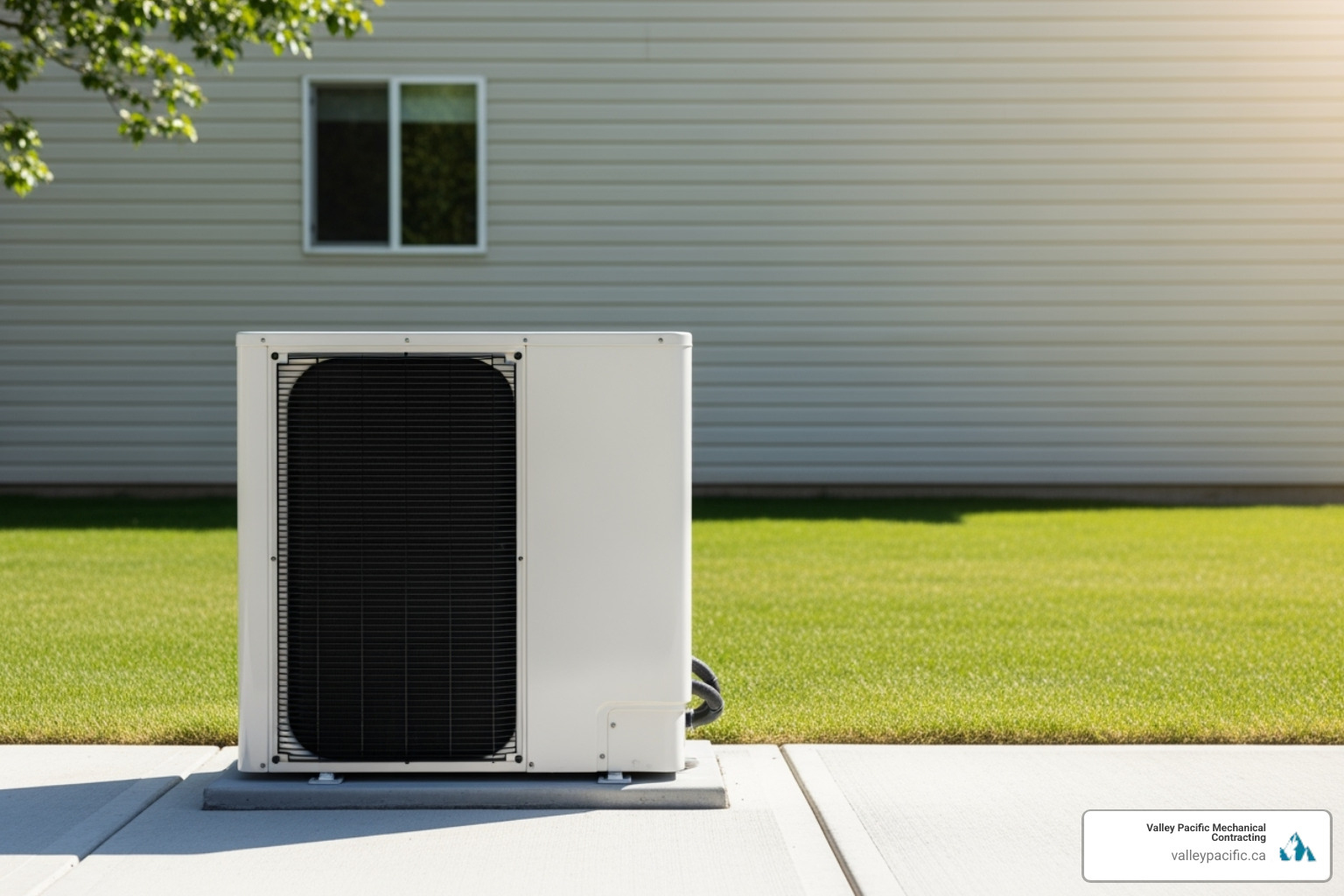Keep Your Cool: A Comprehensive Guide to Air Filtration, Tune-Ups, and More


Why Heat Pump Maintenance Matters for Your Home
Heat pump maintenance is key to keeping your system running efficiently, saving you money on energy bills and ensuring year-round comfort. Here’s a quick overview:
DIY Tasks:
- Monthly: Check and replace air filters.
- Seasonally: Clear debris from the outdoor unit, clean coils, and check condensate drains.
Professional Service:
- Schedule annual inspections for deep cleaning, electrical checks, and system efficiency tests.
Regular maintenance can boost your heat pump's energy efficiency by 10-25%. A well-maintained system with a high coefficient of performance (COP) is far more efficient than alternatives like electric baseboard heaters.
Without proper care, dust and debris build-up, refrigerant levels can drop, and parts wear out faster. This leads to higher energy bills, poor air quality, and unexpected breakdowns. While many tasks are simple for homeowners, professional technicians are essential for annual tune-ups to handle the more complex work.

Why Regular Maintenance is Non-Negotiable
Your heat pump works hard every day, switching between heating and cooling. Like a car, it needs consistent care to perform its best. Heat pump maintenance is essential for protecting your investment and keeping your home comfortable.
A well-maintained heat pump can be 10-25% more energy-efficient than a neglected one, leading to significant savings on your utility bills. Regular care delivers several key benefits:
- Lower Energy Bills: A clean, efficient system uses less power. Its Coefficient of Performance (COP) remains high, meaning it produces more heat or cooling for every unit of electricity consumed. When filters clog or coils get dirty, the system works harder, and your bills go up.
- Longer Equipment Lifespan: Proactive maintenance prevents wear and tear, extending the life of your heat pump.
- Improved Air Quality: Clean filters are crucial for trapping dust, allergens, and pollutants. This is especially important for households with allergies or asthma, as it leads to cleaner air and easier breathing.
- Consistent Comfort: A well-maintained system provides even temperature control and manages humidity levels, eliminating hot and cold spots.
- Fewer Breakdowns: Regular tune-ups catch small issues before they become costly emergency repairs. Think of it as insurance for your comfort. If you do need help, our Expert Heat Pump Repair Services are available.
If you're considering a new system, learn more about the Consider Heat Pump Installation Reasons. For residents in Maple Ridge, our Heat Pump AC Services Maple Ridge BC team can help optimize your system's performance.
Your DIY Maintenance Checklist
While professional tune-ups are essential, several DIY tasks can keep your system running smoothly. These simple steps can significantly impact your heat pump's efficiency and lifespan.
Safety First: Always turn off the power to your heat pump at both the thermostat and the circuit breaker before performing any maintenance. Consult your owner's manual for model-specific instructions.
For more tips custom to our local climate, see our Seasonal Heat Pump Maintenance Tips.

How Often to Clean or Replace Heat Pump Filters
Your heat pump's filter traps dust, pet hair, and pollen, protecting the system's inner components. Different filter types exist, including disposable fiberglass or pleated filters and reusable washable ones. Look at the MERV rating (Minimum Efficiency Reporting Value) to gauge filtration effectiveness—a higher number means cleaner air. You can learn more about MERV ratings to choose the right one for your home.
Check your filter monthly. You may need to replace it every month during heavy use seasons or every three months in milder weather. If you can't see light through it, it's time for a change. A dirty filter restricts airflow, forcing your system to work harder, which increases energy bills and can cause it to overheat or freeze. When installing a new filter, ensure the airflow arrow points toward the unit and it fits snugly. For specific advice on Daikin systems, contact our Daikin Heat Pump Service team.
Ensuring Proper Airflow for Your Heat Pump
Proper airflow is critical for your heat pump's efficiency. Both indoor and outdoor units need to "breathe" without obstruction.
Outdoor Unit: Regularly clear leaves, grass, and debris from around the unit. Maintain at least 18 inches of clearance on all sides for plants and other objects. For tips on placement, see our guide on Best Locations for Heat Pump Placement. In winter, gently brush away snow. If ice forms, don't chip it off; turn the unit off to let it melt or carefully pour lukewarm water over it, avoiding electrical parts.
Indoor Vents: Ensure supply and return vents are not blocked by furniture, rugs, or curtains. Good airflow is key to distributing conditioned air. In rooms with closed doors, consider solutions like jumper ducts or undercutting doors to improve circulation.

Cleaning Coils and Condensate Drains
Clean coils are essential for efficient heat transfer and lower energy bills.
Outdoor Coil: After turning off the power, you can gently rinse the outdoor coil with a garden hose. For stubborn dirt, use a soft brush. Specialized coil cleaners can be used, but follow the instructions carefully.
Indoor Coil: The indoor coil is harder to access and is best cleaned by a professional. You can vacuum any visible dust in the area, but deep cleaning requires an expert.
Condensate Drain: This drain removes moisture your system collects. To prevent clogs from algae and mold, periodically flush the line with a vinegar and water solution. Watch for warning signs like standing water near the indoor unit, musty smells, or water stains, as these indicate a clog that needs immediate attention to prevent water damage.
The Professional Heat Pump Maintenance Checklist
While DIY tasks are helpful, some heat pump maintenance requires a trained professional. We recommend a professional tune-up at least once a year, though bi-annual service (spring and fall) is ideal for peak performance and maintaining warranty coverage. Certified technicians, like those recognized by DOE's Heat Pump Programs, can spot issues you might miss, preventing costly problems. For year-round care, consider our Comprehensive Heat Pump Service Plans.

What a Technician Inspects During a Tune-Up
During a professional heat pump maintenance visit, a technician performs a comprehensive inspection, including:
- Refrigerant Levels: Checking for the correct charge is crucial for performance. Low levels indicate a leak that needs professional repair.
- Electrical Connections: Tightening all connections and inspecting capacitors and contactors for safety and proper function.
- Motor Lubrication: Ensuring all moving parts operate smoothly to reduce friction and wear.
- Blower Components: Deep cleaning the blower wheel and assembly to ensure proper airflow.
- Thermostat Calibration: Verifying the thermostat is accurate to prevent energy waste.
- Defrost Cycle: Testing this function is essential for winter operation to prevent ice buildup.
- Ductwork Inspection: Checking for leaks that waste energy and reduce comfort.
- Coil and Condensate Drain Cleaning: Performing a deep clean of coils and ensuring the condensate drain is clear to prevent water damage.
Maintenance for Different Heat Pump Types
Different heat pump types have unique maintenance needs. A professional service will address the specific requirements of your system.
| Heat Pump Type | Key Maintenance Focus |
|---|---|
| Air-Source | Outdoor unit care, defrost cycle, coil cleaning. |
| Geothermal | Indoor unit care, pump and fluid level checks. |
| Ducted | Ductwork sealing, airflow balancing, filter maintenance. |
| Ductless | Cleaning individual head units, filters, and drains. |
- Air-source systems require diligent outdoor unit care due to weather exposure.
- Geothermal systems need professional checks of the ground loop's circulating pump and fluid levels.
- Ducted systems benefit from duct inspections to find and seal leaks.
- Ductless mini-splits need each indoor head cleaned professionally to prevent mold and maintain efficiency.
For expert care custom to your system in Maple Ridge, contact our Heat Pump Service Maple Ridge BC team.
Telltale Signs Your Heat Pump Needs Attention
Your heat pump will often signal when it needs attention. Recognizing these warning signs early can help you avoid expensive repairs. For a detailed list, see our guide on Signs Your Heat Pump Needs Repair. Key signs include:
- Unusual Noises: Grinding, rattling, or squealing sounds can indicate worn or loose parts.
- Poor Performance: If the system struggles to heat or cool evenly, it could be due to low refrigerant or airflow problems.
- Short Cycling: Frequent on-and-off cycles put major stress on the system and waste energy.
- Rising Energy Bills: A sudden spike in costs often means your heat pump is working inefficiently.
- Ice Buildup: Thick ice on the outdoor unit or refrigerant lines signals a serious issue.
- Strange Odors: Musty or burning smells require immediate professional diagnosis.
Common Heat Pump Issues and How to Address Them
Many common heat pump issues stem from neglected heat pump maintenance. Here are a few frequent problems:
- Frozen Coils: Often caused by dirty filters, blocked airflow, or low refrigerant. A malfunctioning defrost cycle is another culprit. Learn more about Why is my Heat Pump not Defrosting.
- Refrigerant Leaks: Signs include hissing sounds, ice on refrigerant lines, and poor performance. This repair requires a certified technician.
- Faulty Reversing Valve: This causes the system to get stuck in heating or cooling mode.
- Compressor Issues: Grinding noises or difficulty starting can signal a problem with the compressor, the heart of your system. Preventive maintenance is key to avoiding this serious issue.
- Electrical Problems: Beyond checking your breaker, electrical issues should always be handled by a professional.
Your system may also display diagnostic messages. Learn to decipher them by Understanding Heat Pump Error Code.
When to Call for Professional Heat Pump Repair
Knowing when to call a professional is key to protecting your investment and your safety. Call for help when you encounter:
- Persistent Problems: If basic DIY troubleshooting (like changing filters or clearing debris) doesn't fix the issue.
- Safety Concerns: Immediately call a pro for burning smells, tripped breakers, or loud mechanical noises.
- Complex Electrical Work: Anything beyond checking the circuit breaker requires a trained technician.
- Refrigerant Handling: Refrigerant leaks must be handled by a certified professional.
If you feel uncertain about a repair, it's always best to call an expert. Our team provides safe and efficient service. For local assistance, contact our Heat Pump Repair Langley BC or Heat Pump Repair Pitt Meadows BC teams.
Frequently Asked Questions about Heat Pump Care
We get a lot of questions about heat pump maintenance. Here are answers to some of the most common ones:
How often should a heat pump be professionally serviced?
We recommend professional service at least once a year. An annual tune-up is crucial for efficiency, preventing breakdowns, and extending your system's lifespan. For optimal performance, consider bi-annual servicing: one visit in the spring for cooling season prep and another in the fall for heating. Regular professional maintenance is also often required to keep your manufacturer's warranty valid.
Can I perform all heat pump maintenance myself?
While homeowners can and should perform simple heat pump maintenance tasks like changing air filters and clearing debris from the outdoor unit, some jobs are best left to professionals. Tasks involving refrigerant, electrical connections, and internal motors require specialized tools and training. Attempting these complex repairs yourself can be dangerous, cause more damage, and may void your warranty. It's always safest to leave technical work to certified technicians.
What happens if I neglect my heat pump?
Neglecting your heat pump leads to a snowball of problems. You can expect:
- Reduced Efficiency and Higher Bills: A dirty, unmaintained system works harder, consuming more energy and increasing your utility costs.
- Poor Indoor Air Quality: Clogged filters fail to remove dust and allergens from your home's air.
- Unexpected Breakdowns: Neglect increases the likelihood of system failure, often during extreme weather when you need it most.
- Shortened Lifespan: A neglected heat pump may only last 8-10 years instead of the typical 15-20, forcing a premature and costly replacement.
Regular heat pump maintenance is a small investment that prevents these major headaches and pays for itself in savings and reliability.
Conclusion
Regular heat pump maintenance is your key to year-round comfort, lower energy bills, and a longer-lasting system. As we've covered, a combination of simple DIY tasks and professional service is the most effective approach.
Simple steps like monthly filter changes and keeping the outdoor unit clear make a huge difference. Paired with annual professional tune-ups, this proactive care helps you avoid the stress and expense of emergency repairs. A well-maintained heat pump is 10-25% more efficient, saving you money while providing cleaner air and more consistent comfort.
While DIY maintenance is important, complex tasks involving electrical or refrigerant systems should always be left to experienced professionals for safety and effectiveness.
For expert service in Langley, Maple Ridge, and Mission, trust the team at Valley Pacific Mechanical Contracting. We're committed to providing a "headache-free" experience to keep your system running smoothly.
Ready to give your heat pump the professional care it deserves? Schedule your professional heat pump service today and enjoy reliable comfort all year long.








